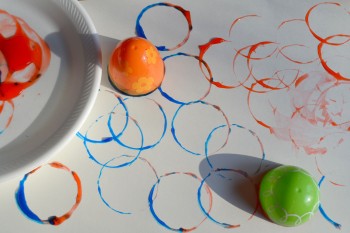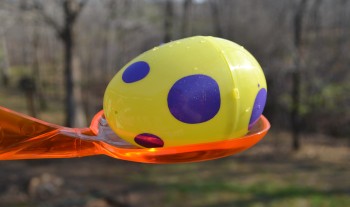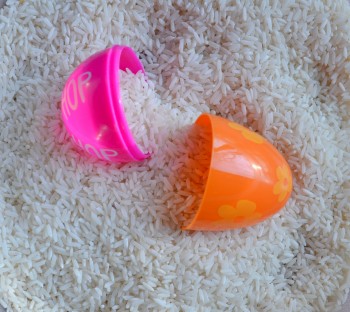What can you do with a 1 dollar bag of plastic eggs from the dollar store?
Saturday, April 30, 2011
Red Flashing LIghts
Tuesday, April 26, 2011
Communicating With Your Preschooler
Here are some tips for starting small conversations that cover big ideas, and begin to shape the values children develop.
A good communicator:
- Encourages with verbal and non-verbal cues – Children feel more welcome to talk when an adult stoops to their level and initiates conversation with a smile. Use praise and affection.
- Works as a team – Children need a playbook on how to negotiate new surroundings and people. Coordinate consistency between a parents to help make learning important family values and behavioral expectations easier.
- Gives full attention - Children are always watching adults. Their observations skills are keen because their verbal skills haven’t taken over yet. Turn off the radio or DVD player, and listen when your child speaks. Give them time to finish a thought, and make eye contact (if you aren’t driving). The timing of their important questions won’t always be convenient. Most experts agree that the most “teachable” moments are spontaneous, casual opportunities. For example, if the preschooler pops the question about where his new baby sister will come from on the drive to school, it is to the advantage of the parent to give full attention to laying the groundwork for future, less embarrassing discussions.
- Is honest - The easiest answer may be “I don’t know, let’s find out together.” Remember, parents get good grades for being inquirers too. Reminding children that grown-ups don’t know everything and sometimes have to figure it out too gives children key problem-solving skills and permission to make mistakes. Having a sense of humor about our own shortcomings also relieves tension and provides us a great way to laugh with our children.
- Sets aside alone time to talk - Other important parenting responsibilities often steal away individualized time with and attention to our children. Just as setting aside time each week is important to stay on top of big assignments at work or school, it is equally as important to the parent-child relationship.
- Encourages and respects children’s opinions/feelings - Try to remember that children perceive problems and conflicts differently. They do not have the years of experience that we have and more importantly, they lack the verbal skills to express emotions. Encourage and model for your child how to express feelings; for example, “I need to make sure I understand. You’re sad/mad because . . . “ Or, “You seem really upset. Did something happen at school/daycare today that did not go your way?” Repeating, identifying emotions, and clarifying questions invite children to speak up, and to consider the impact of their words and feelings on others.
Sunday, April 17, 2011
RACE TO NOWHERE
Burlington Public Schools in partnership with Wilmington Public Schools will host a screening of the documentary film, Race to Nowhere onThursday, April 28th at 7:00 pm in the Burlington High School auditorium. This film looks at today’s challenges through the student’s perspective and is an excellent film. The advance ticket price is $10.00 for adults and $5.00 for students and can be reserved athttp://rtnburlingtonhigh-auto.eventbrite.com/.

Thursday, April 14, 2011
Musical Performance
Wednesday, April 13, 2011
Your Baby Can Read
By Jeff Rossen and Robert Powell
http://today.msnbc.msn.com/id/42557517/ns/today-money/
A national watchdog group that campaigned successfully to change the way the popular “Baby Einstein” program markets its product is now trying to get the folks at “Your Baby Can Read” to do the same.
The Campaign for a Commercial-Free Childhood recently filed a complaint with the Federal Trade Commission alleging that “Your Baby Can Read” uses deceptive marketing to get parents to buy its DVDs, flashcards and other materials.
Last year, an NBC News investigation that aired on TODAY found that child development experts from coast to coast were of the collective opinion that while young children can be made to recognize or memorize words, the brains of most infants and toddlers are just not developed enough to actually learn to read at the level the way the enticing television ads claim they can.
Video: Troubles mount for ‘Your Baby Can Read’ program (on this page)"It's deceptive, and it's really harmful. Parents are shelling out all this money for something that is basically snakeoil,” said Susan Linn, executive director of the Campaign for a Commercial-Free Childhood. "We were just so pleased that the TODAY show took this on. It's the first expose we've seen about this product."
Linn’s group claims in its FTC complaint that “Your Baby Can Read” is not only false and misleading, the program “poses significant health and safety risks to infants” who are encouraged to sit in front of TVs and computer monitors by parents who hope they can get a headstart on life by teaching their children to read early.
“There’s no evidence that ‘Your Baby Can Read’ is doing anything for babies except potentially harming them by getting them hooked on screens so early in life,” said Linn. “If parents follow the ‘Your Baby Can Read’ instructions, after 9 months, babies would have spent over a full week of 24 hour days in front of a screen. The American Academy of Pediatrics recommends no screen time for children under the age of 2. So does the White House task force on childhood obesity.”
What do you think of educational programs for babies?
Linn says parents have been hoodwinked by the product. "We want the FTC to stop "Your Baby Can Read" from false and deceptive marketing, and we want "Your Baby Can Read" to offer refunds to all those parents who have been duped," she said.
The FTC confirmed that they are reviewing the new complaint. Asked for comment, “Your Baby Can Read” told NBC News: “We are proud of our accomplishments … Thousands of parents have shared the success stories of their children with us, and hundreds have sent us videos of their children’s progress.”
Asked last year about those who are of opinion that children cannot really learn to read until they are 4 or 5 years old, the creator of “Your Baby Can Read” dismissed the criticisms.
“They’re all wrong,” said Dr. Robert Titzer, who calls himself an infant learning expert but actually holds a graduate degree in “human performance” — the study of motor skills.
Titzer told TODAY at the time that his program is backed by scientific research. He acknowledged that it starts with memorization, but insisted it leads to reading.
“The baby does learn to read,” he said. “My children could read better at age 4 than I could at age, you know, at my age.”
The Campaign for a Commercial-Free Childhood’s fight against “Baby Einstein” brought customer refunds and changes in how that product is marketed in 2006. It is still on the market, however.
Related: Preschoolers watching WAY too much TV
The FTC closed its investigation in 2007 without recommending any enforcement action. The agency noted at the time that “Baby Einstein” had voluntarily revised its claims and that there were no conclusive scientific studies about the effects of watching too much television on infants or toddlers.
Where does that leave parents? Experts say the best way to teach your baby to read is free: Read to them, sign to them and expose them to language. And when they are ready, they’ll read.
Tuesday, April 12, 2011
Phonemic Awareness
Phonemic Awareness http://earlyliteracyconnection.blogspot.com/2011/04/phonemic-awareness.html
2. Phonemic Awareness
Phonemic Awareness is being able to hear the individual sounds in the words we say. Children need this skill for learning to read (by blending the sounds of a word together) and when learning to spell (by breaking the word down into its individual letters).

Here are some to try:
- Read books that focus on rhyme and alliteration. Some great ones are:

Each Peach Pear Plum by J. and A. Ahlberg
 A Giraffe and a half by S. Silverstein
A Giraffe and a half by S. Silverstein
- Say 3 rhyming words aloud, such as, cat, mat, and hat. Have your child think of other words that rhyme with those words.
- Create a Rhyming Poem. Have your child suggest words to fill in each blank:
Once I Saw
Once I saw a cat,
And it wore a funny little _________ .
Tra-la-la, la-la-la-la-la
Silly little cat.
Once I saw a goat,
And it wore a funny little _________ .
Tra-la-la, la-la-la-la-la
Silly little goat.
If your child has mastered the rhyming tasks, then try phoneme counting activities. Most children have mastered phoneme counting by the end of the 1st grade.
Here are some to try:
Ask your child to tell you what the first sound is in fun, fly, and friend. Have them tell you other words that begin with /f/.
- Write two words on a piece of paper, such as pat and cat, and have your child to tell you which letter is different in each word. If they are really good at this, have them listen for the last sound in each word. For instance, “What’s the last sound in foot, bat, pet?”
- Say your child’s name in individual phonemes. Have them repeat it for you.
Sunday, April 10, 2011
Fun with Plastic Eggs
I came across this blog post and enjoyed all the fun things you can with plastic eggs. This time of year they are easy to find and are very affordable. With a little creativity they can be a great learning tool.
1. Play a matching game. Take them apart, then have your child place matching the designs or colors together.
2. Have the traditional egg hunt. However, when you hide them from your older preschoolers, hide them in more challenging locations. Give them verbal directions and hints to improve listening skills, prepositions, and attention while you play.
Also, let kids hide the eggs and then have the grown-ups hunt for them. The children can give you directions and hints when you have trouble locating the eggs to increase verbal skills.
Once the hunt is over count the eggs to be sure you have found all of the eggs. ![]()
3. Use them to make circle prints. Squirt paint onto a paper plate, dip the egg half into the paint, and then press it on paper.
4. While you have the paint out, have an artistic Easter egg roll. Tape paper into the bottom of a cardboard box or in a plastic box. Dip the eggs into paint, then roll the egg across the paper by tipping the box various directions.
5. Have an old fashioned egg-on-the-spoon race. Or if you don’t want to race, use a spoon to scoop up eggs to put them in a basket. Count them as you scoop them. Use a large spoon. To create the spoon below I took apart a set of salad tongs that I purchased at Dollar General. The eggs are from the Dollar Tree.
5. Use them as a scoop to play in rice or beans.
6. Toss them into a bucket.
7. Fill them with rice, beans or other material and glue them shut to make rhythm instruments with various sounds. I used a cool temperature glue gun. You have to move fast! Quickly apply the glue then put the egg together with the rice and press firmly together. I had my husband try to pull apart the egg, and he found it to be firmly set in place.
Friday, April 1, 2011
Speech & Articulation Development Chart
Please use the following chart as a guide to help you determine if your child has a delay with their speech and language development. The Burlington Integrated Preschool has two full time speech and language pathologist that are available to screen children if you have concerns about language development. After reviewing the chart and you continue to have concerns please call the office to set up an appointment for a screening. 781-273-7632.
http://www.talkingchild.com/speechchart.aspx
Speech & Articulation Development Chart
In the chart below, each solid bar indicates when children generally MASTER the specified sounds. This chart depicts a range of development and should only be used as a general guide.
|
| birth | 1 year | 2 years | 3 years | 4 years | 5 years | 6 years | 7 years | 8 years | |||||||||
| p,m,h,w,b | |||||||||||||||||
| p,m,h,w,b | |||||||||||||||||
| n | |||||||||||||||||
| n | |||||||||||||||||
| k | |||||||||||||||||
| k | |||||||||||||||||
| g | |||||||||||||||||
| g | |||||||||||||||||
| d | |||||||||||||||||
| d | |||||||||||||||||
| t | |||||||||||||||||
| t | |||||||||||||||||
| ing | |||||||||||||||||
| ing | |||||||||||||||||
| f | |||||||||||||||||
| f | |||||||||||||||||
| y | |||||||||||||||||
| y | |||||||||||||||||
| r | |||||||||||||||||
| r | |||||||||||||||||
| l | |||||||||||||||||
| l | |||||||||||||||||
| blends (st, pl, gr, etc.) | |||||||||||||||||
| blends (st, pl, gr, etc.) | |||||||||||||||||
| s | |||||||||||||||||
| s | |||||||||||||||||
| sh, ch | |||||||||||||||||
| sh, ch | |||||||||||||||||
| z | |||||||||||||||||
| z | |||||||||||||||||
| j | |||||||||||||||||
| j | |||||||||||||||||
| v | |||||||||||||||||
| v | |||||||||||||||||
| th (thumb) | |||||||||||||||||
| th (thumb) | |||||||||||||||||
| th (that) | |||||||||||||||||
| th (that) | |||||||||||||||||
| zh (measure) | |||||||||||||||||
| zh (measure) | |||||||||||||||||
©2003 Talking Child, LLC http://www.talkingchild.com
*It is important to note that this information depicts a general range of development, and should only be used as a guide. If you have any concerns regarding your child’s speech development, we recommend that you contact a pediatrician or speech-language pathologist.













